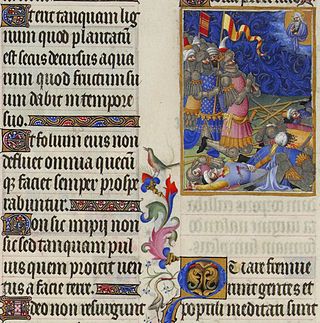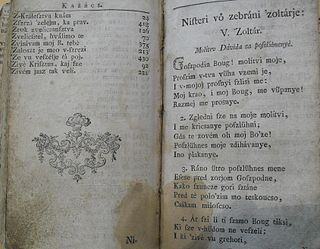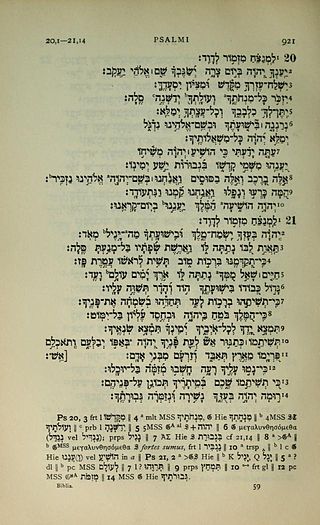
The Hail Mary or Angelical salutation is a traditional Christian prayer addressing Mary, the mother of Jesus. The prayer is based on two biblical passages featured in the Gospel of Luke: the Angel Gabriel's visit to Mary and Mary's subsequent visit to Elisabeth, the mother of John the Baptist. It is also called Angelical salutation as the prayer is based on the Archangel Gabriel's words to Mary. The Hail Mary is a prayer of praise for and of petition to Mary, regarded as the Theotokos. Since the 16th century, the version of the prayer used in the Catholic Church closes with an appeal for her intercession. The prayer takes different forms in various traditions and has often been set to music.

The Beatitudes are sayings of Jesus, and in particular eight blessings recounted by Jesus in the Sermon on the Mount in the Gospel of Matthew, and four in the Sermon on the Plain in the Gospel of Luke, followed by four woes which mirror the blessings. Each is a proverb-like proclamation, without narrative.

As-salamu alaykum, also written salamun alaykum and typically rendered in English as salam alaykum, is a greeting in Arabic that means 'Peace be upon you'. The salām has become a religious salutation for Muslims worldwide when greeting each other, though its use as a greeting pre-dates Islam, and is also common among Arabic speakers of other religions.

The word thou is a second-person singular pronoun in English. It is now largely archaic, having been replaced in most contexts by the word you, although it remains in use in parts of Northern England and in Scots. Thou is the nominative form; the oblique/objective form is thee ; the possessive is thy (adjective) or thine ; and the reflexive is thyself. When thou is the grammatical subject of a finite verb in the indicative mood, the verb form typically ends in -(e)st, but in some cases just -t.

"Gloria in excelsis Deo" is a Christian hymn known also as the Greater Doxology and the Angelic Hymn/Hymn of the Angels. The name is often abbreviated to Gloria in Excelsis or simply Gloria.
"Tantum ergo" is the incipit of the last two verses of Pange lingua, a Medieval Latin hymn generally attributed to St Thomas Aquinas c. 1264, but based by Aquinas upon various earlier fragments. The "Genitori genitoque" and "Procedenti ab utroque" portions are adapted from Adam of Saint Victor's sequence for Pentecost. The hymn's Latin incipit literally translates to "Therefore so great".

Matthew 5:9 is the ninth verse of the fifth chapter of the Gospel of Matthew in the New Testament. It is the seventh verse of the Sermon on the Mount, and also seventh of what are known as the Beatitudes.

The Fruit of the Holy Spirit is a biblical term that sums up nine attributes of a person or community living in accord with the Holy Spirit, according to chapter 5 of the Epistle to the Galatians: "But the fruit of the Spirit is love, joy, peace, patience, kindness, goodness, faithfulness, gentleness, and self-control." The fruit is contrasted with the works of the flesh which immediately precede it in this chapter.

Matthew 5:26 is the twenty-sixth verse of the fifth chapter of the Gospel of Matthew in the New Testament and is part of the Sermon on the Mount. Jesus has just warned that if you do not reconcile with your enemies a judge is likely to throw you in jail. In this verse Jesus mentions that your debts must be paid completely before one can leave.

A grace is a short prayer or thankful phrase said before or after eating. The term most commonly refers to Christian traditions. Some traditions hold that grace and thanksgiving imparts a blessing which sanctifies the meal. In English, reciting such a prayer is sometimes referred to as "saying grace". The term comes from the Ecclesiastical Latin phrase gratiarum actio, "act of thanks." Theologically, the act of saying grace is derived from the Bible, in which Jesus and Saint Paul pray before meals. The practice reflects the belief that humans should thank God who is the origin of everything.

Psalm 91 is the 91st psalm of the Book of Psalms, beginning in English in the King James Version: "He that dwelleth in the secret place of the most High shall abide under the shadow of the Almighty." In Latin, it is known as 'Qui habitat". As a psalm of protection, it is commonly invoked in times of hardship. Though no author is mentioned in the Hebrew text of this psalm, Jewish tradition ascribes it to Moses, with David compiling it in his Book of Psalms. The Septuagint translation attributes it to David.
Dominus vobiscum is an ancient salutation and blessing traditionally used by the clergy in the Masses of the Catholic Church and other liturgies, as well as liturgies of other Western Christian denominations, such as Lutheranism, Anglicanism and Methodism.

Absolution of the dead is a prayer for or a declaration of absolution of a dead person's sins that takes place at the person's religious funeral.

Psalm 2 is the second psalm of the Book of Psalms, beginning in English in the King James Version: "Why do the heathen rage". In Latin, it is known as "Quare fremuerunt gentes". Psalm 2 does not identify its author with a superscription, but Acts 4:24–26 in the New Testament attributes it to David. According to the Talmud, Psalm 2 is a continuation of Psalm 1.

Psalm 5 is the fifth psalm of the Book of Psalms, beginning in English in the King James Version: "Give ear to my words, O LORD, consider my meditation". In Latin, it is known as "Verba mea auribus percipe Domine". The psalm is traditionally attributed to David. It is a reflection of how the righteous man prays for deliverance not only for freedom from suffering, but to allow himself to be able to serve God without distraction. The New King James Version entitles it "A Prayer for Guidance".

Psalm 21 is the 21st psalm of the Book of Psalms, beginning in English in the King James Version: "The king shall joy in thy strength". The Book of Psalms is part of the third section of the Hebrew Bible, and a book of the Christian Old Testament. In the slightly different numbering system used in the Greek Septuagint and Latin Vulgate translations of the Bible, this psalm is Psalm 20. In Latin, it is known by the incipit, "Domine in virtute tua". The psalm is attributed to David.

Psalm 32 is the 32nd psalm of the Book of Psalms, beginning in English in the King James Version: "Blessed is he whose transgression is forgiven". The Book of Psalms is part of the third section of the Hebrew Bible, and a book of the Christian Old Testament. In the slightly different numbering system used in the Greek Septuagint and Latin Vulgate translations of the Bible, this psalm is Psalm 31. In Latin, it is known by the incipit, "Beati quorum". The psalmist expresses the joy of being released from great suffering.

Psalm 37 is the 37th psalm of the Book of Psalms, beginning in English in the King James Version: "Fret not thyself because of evildoers, neither be thou envious against the workers of iniquity". The Book of Psalms is part of the third section of the Hebrew Bible, and a book of the Christian Old Testament. In the slightly different numbering system used in the Greek Septuagint and Latin Vulgate translations of the Bible, this psalm is Psalm 36. In Latin, it is known as Noli aemulari in malignantibus. The psalm has the form of an acrostic Hebrew poem, and is thought to have been written by David in his old age.

Psalm 128 is the 128th psalm of the Book of Psalms, beginning in English in the King James Version: "Blessed is every one that feareth the LORD; that walketh in his ways". In Latin, it is known as "Beati omnes qui timent Dominum".
Seed of the woman or offspring of the woman is a phrase from the Book of Genesis: as a result of the serpent's temptation of Eve, which resulted in the fall of man, God announces that he will put an enmity between the seed of the serpent and the seed of the woman. In Christianity, this verse is known as the protoevangelium, and is interpreted as a prophecy of the coming of Jesus. In Judaism, the "seed of the woman" is taken as a collective reference to mankind in general.

















